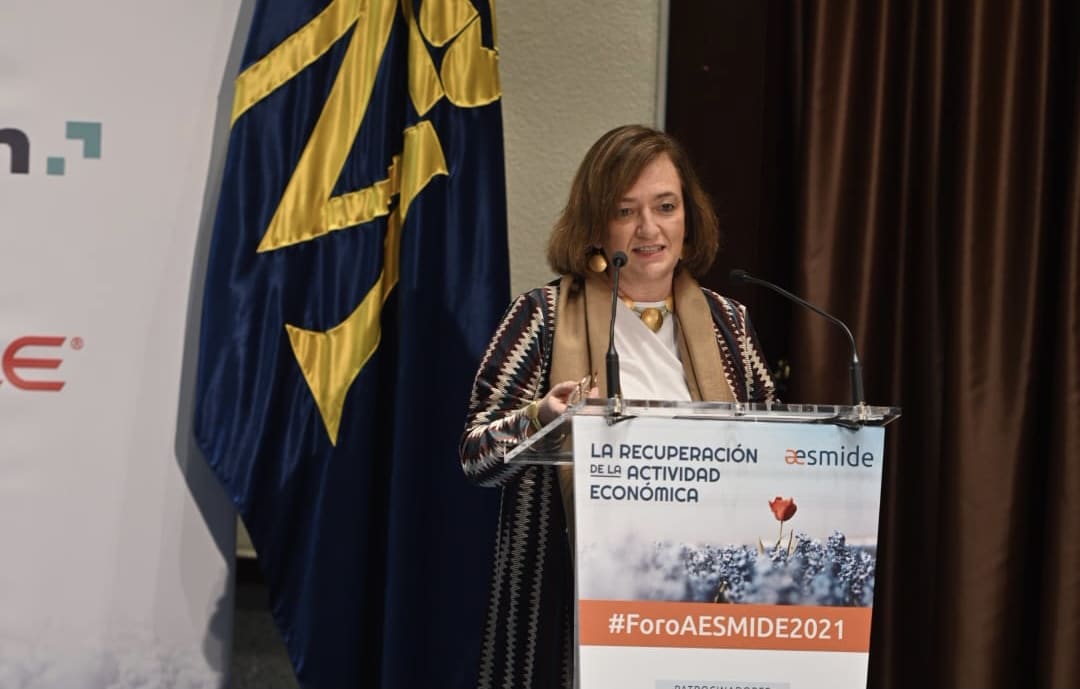- AIReF’s President stated that the recovery is subject to two major uncertainties: the new fiscal framework after the deactivation of the escape clause, possibly in 2023, and the impact of the Funds from the Recovery, Transformation and Resilience Plan (RTRP)
- Cristina Herrero explained that the economy is recovering at a slower pace than previously estimated and, furthermore, the health risk, among others, remains
- She insisted on the need to design a medium-term strategy that provides certainty and predictability, and that reconciles economic and budgetary challenges
- Cristina Herrero highlighted the role of Independent Fiscal Institutions (IFIs), such as AIReF, in ensuring sustainability in the future governance framework
The President of the Independent Authority for Fiscal Responsibility (AIReF), Cristina Herrero, participated on Thursday, December 2nd in the Forum on “The recovery of economic activity”, organised by the Association of Contractors with Public Authorities (AESMIDE). In her speech, she analysed the economic and budgetary challenges of the recovery, highlighting two major uncertainties: the new European fiscal framework, with the possible deactivation of the escape clause in 2023, and the impact of the funds from the Recovery, Transformation and Resilience Plan (RTRP). Senior officials from the Central State Administration, Spanish politics and the business world also participated in the event.
In the first part of her speech, “Spain in the European Fiscal Framework”, Cristina Herrero addressed the challenge of economic recovery in the current environment of high uncertainty as a result of the decline in activity and the fiscal deterioration brought about by the pandemic. She highlighted that, although indicators in 2021 have left the impression that the most critical stage of the crisis has passed, the economy is recovering less intensely than previously estimated. In addition, health risks and other new risks still remain, such as the price of energy raw materials, at all-time highs, and the emergence of manufacturing bottlenecks. In addition to this situation, she noted, it is also important to remember that Spain faces the recovery from a more vulnerable position due to the increase in public debt.
In this context, AIReF’s President insisted on the need to design a medium-term strategy that provides certainty and predictability, and that reconciles the economic and budgetary challenges facing the country.
End of the escape clause
With a focus on the likely end of the escape clause in 2023, Cristina Herrero warned that the reform of the fiscal framework raises numerous questions about when it will happen, what its scope will be, and whether a framework of homogenous quantitative rules will persist. She thus stated the need to aim for quality in public finances, differentiation between countries and enhancement of Independent Fiscal Institutions (IFIs), taking this reform as an opportunity to reconsider the national fiscal framework in which AIReF has identified certain deficiencies.
In this regard, Cristina Herrero pointed out that Spain has a complex and unpredictable system, with weak planning, little medium-term vision and limited attention to debt and sustainability. It is a system that is extremely geared towards supervising the Territorial Administrations, with unenforceable rules and with no regulatory implementation clarifying concepts and methodologies. IFIs, such as AIReF, have a great deal to contribute in the reform of such shortcomings.
Impact of the RTRP
The Next Generation EU funds are the European Union’s (EU) largest stimulus package to date and their characteristics set them apart from other traditional European funds. In addition, Spain will be one of the countries that will benefit the most: in the period between 2021 and 2023, it will receive around €35bn per year and will absorb almost 21% of the transfers from the Recovery and Resilience Facility (RRF).
All this generates major uncertainties as regards the economic and budgetary impact. Therefore, as Cristina Herrero explained, efficiency in the management of the funds and the quality of the projects chosen will be fundamental. A point in which evaluations – ex ante, during execution and ex post – play a key role and require the involvement of all levels of the public sector, the private sector and all evaluation bodies.
Sustainability of public finances
AIReF’s President recalled that the activation of the escape clause and the suspension of fiscal rules do not imply a lack of attention to sustainability or the absence of fiscal supervision by the Institution. In this regard, she explained that the role of the IFIs has been essential for giving consistency to EU guidelines and national fiscal plans, for providing a medium-term vision and attention to sustainability and for offering transparency in the implementation of the large number of measures.
In particular, AIReF has continued its supervisory activity with the publication of both traditional reports, with approaches tailored to the situation, and new ones, on the exceptional causes of the activation of the escape clause.






